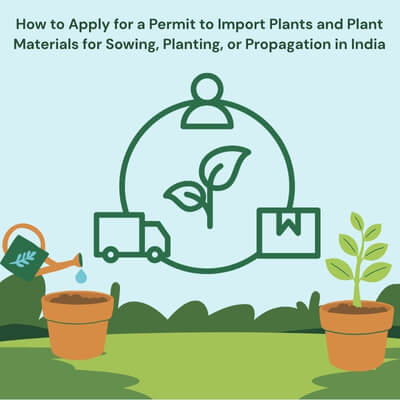
In the modern era of global agriculture and plant trade, India has opened up new opportunities for importing high-quality seeds, exotic plant varieties, and advanced tissue culture materials. However, the biological risks associated with these imports—such as the introduction of foreign pests, diseases, or invasive species—pose serious threats to India's native biodiversity and agricultural ecosystem.
To mitigate such risks and preserve India's agro-ecological balance, the Government of India has implemented a robust regulatory framework rooted in two key legal instruments: the Destructive Insects and Pests Act, 1914 and the Plant Quarantine (Regulation of Import into India) Order, 2003. These regulations empower central authorities to monitor, inspect, and control the entry of plant materials at designated ports of entry, ensuring that only safe, pest-free, and compliant consignments are allowed into the country.
As per this framework, any individual or entity—whether for commercial cultivation, botanical research, educational purposes, or nursery propagation—must obtain a valid Import Permit before bringing any plant, plant part, or propagation material into India. This permit is not merely a formality but a mandatory compliance document that triggers a series of inspections, phytosanitary certifications, and—when necessary—quarantine protocols.
This blog aims to provide a comprehensive understanding of the legal foundation behind this requirement and to walk you through the step-by-step application procedure for obtaining a Permit to Import Plants/Plant Materials for Sowing, Planting, or Propagation. Whether you are a grower looking to import new seed varieties, a nursery importing ornamental plants, or a researcher acquiring tissue culture materials from overseas, this guide will help you navigate the regulatory landscape with clarity and confidence.
The Destructive Insects and Pests Act, 1914 forms the bedrock of India’s legal and regulatory infrastructure for safeguarding agricultural biosecurity. Despite being over a century old, the Act remains highly relevant and effective in addressing modern threats associated with the import and interstate movement of potentially harmful biological materials. Its core objective is to prevent the introduction and spread of any insect, fungus, or pest that could be destructive to crops, forests, or ecosystems within the country.
Section 3 of the Act grants the Central Government the authority to identify and list specific articles or classes of articles—such as seeds, plants, insects, or plant products—that pose a phytosanitary risk. The government can determine the countries of origin, routes of entry, and conditions under which such imports may be allowed or disallowed. This ensures a targeted and risk-based regulatory approach, helping focus surveillance on the highest-risk categories of imports.
Section 4 reinforces the enforcement mechanism by extending the legal authority of customs officers to treat any violation of import regulations under this Act in the same manner as customs violations. This provision integrates biosecurity enforcement with the country’s customs law framework, enabling prompt detention, rejection, or confiscation of non-compliant consignments.
Additionally, Section 5 empowers individual State Governments to formulate their own rules to complement the central framework. These state-level rules may cover the inspection, detention, treatment, and destruction of infected or suspected consignments, as well as outline the roles and responsibilities of quarantine and enforcement officers. This decentralization ensures localized and timely action in response to regional threats.
You are required to apply for an Import Permit if you plan to import any of the following items for agricultural or horticultural use:
Whether the purpose is commercial cultivation, nursery development, botanical research, or crop diversification, this regulation applies.
The first step in the process of obtaining an import permit is to complete the registration on the Plant Quarantine Information System (PQIS) portal.
1. Documents Required for Import Permit
To apply for a permit to import plants or plant materials for sowing, planting, or propagation, the following documents are required:
i) Filled Application Form – PQ Form-02 submitted online through the PQIS portal.
ii) Technical or Justification Note – Explaining the purpose of import.
iii) Product Catalogue or Brochure – Provided by the foreign supplier.
iv) Certificate of Origin – Issued by the exporting country at the time of import.
v) Importer Registration Certificate – For entities dealing with commercial seeds or planting materials.
vi) Recommendation from BSI or NBPGR – As applicable to the type of plant material.
vii) ID and Address Proof – Of the importer or authorized signatory.
viii) Undertaking on Non-Commercial Use – Declaring that the materials are not for resale.
ix) Pay the Prescribed Fee
The fee for processing the application, inspection, and fumigation (if applicable) must be paid online as per rates notified by the Central Government.
The Plant Protection Adviser or designated authority reviews the application, and upon verifying its compliance with all regulatory requirements, issues the Import Permit (PQ Form-04).
When the consignment arrives, it must:
Failure to comply with these conditions can result in detention, return, or destruction of the consignment under the powers granted by the 1914 Act.
The import permit is generally valid for six months and may cover multiple consignments unless otherwise restricted. If your shipment is delayed beyond the permit's validity, a fresh application or extension is necessary
The import of plants and planting materials into India is not just an administrative task—it’s a biosecurity responsibility. The Destructive Insects and Pests Act, 1914, ensures that all incoming agricultural material is subjected to strict scrutiny to protect India’s crops, environment, and farmers. By following the right procedures and obtaining the necessary import permits, you contribute to the safe and sustainable development of India’s agricultural future.
For more details, please click Metacorp Agri Licensing





We are the pioneers in offering environmental consulting services to our patrons, giving us the first mover advantage & keeping us ahead of our competitors.
Very experienced in filing, monitoring & submission of CDSCO Compliances, Drugs Manufacturing & sale guidelines, Environmental Impact Assessment, AERB consulting services, Pollution Control Board CTE & CTO Advisory Services, Waste Management Authorization from State Pollution Control Boards, Fertilizers & Insecticides Manufacturing, Wholesale & Import Compliances
